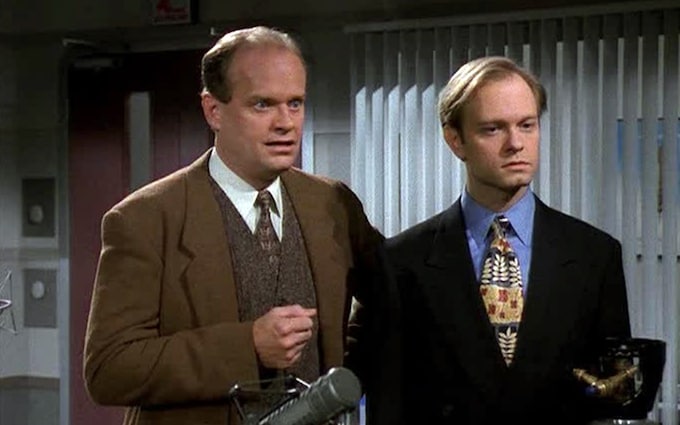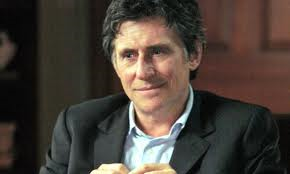Your cart is currently empty!
What psychotherapy / counselling is not like
Disclaimer: I’m in the UK, from a Humanistic, Person-Centred counselling perspective. There will be “therapists” that give advice as a matter of course. However, in this article, when I use the term “therapist”, I’m not describing social workers, guidance counsellors, support workers, psychiatrists, NLP or CBT practitioners, but those who have undergone training as reflective “counsellors” or “psychotherapists” who believe “it is the relationship that heals” (Yalom).
1. Neurotic Sarcasm

Dr Frasier Crane and Dr Niles Crane, fictional psychiatrists from the comedy TV show “Frasier”.
The style of “therapy” shown by Kelsey Grammar and co. is nothing like what you can expect from a UK BACP, NCPS or UKCP accredited counsellor/psychotherapist.
For example: rather than giving advice on how to respond to your situation, or giving a sarcastic response showing disinterest in what matters to you, e.g.:
https://www.youtube.com/watch?v=raclFVQosCU
you are more likely to get a response showing that the therapist really tries to understand how it feels to be in your situation. Maybe they’ll just express the difficulty they can hear you are going through, or maybe you’ll get some questions so they can really understand how it is to be in your shoes.
But you definitely won’t get sarcasm or a dismissal as shown in the clip above. (At least not today; it is alleged that Sigmund Freud did remark to his patient Roy Grinker that even Freud’s dog “couldn’t stand listening” [to him]: “The Gift of Therapy”, p,77, Irvin D. Yalom).
However, the school of Existential psychotherapy (of which Yalom, above, is a member) does advocate genuineness on the part of the therapist. So you could argue that Frasier is being incredibly genuine with his witty response.
But it’s also a very unkind response, so I argue, not really a response you should expect from an ethical therapist.
2. Unchecked Therapists

Paul Weston, fictional psychotherapist played by Gabriel Byrne in “In Treatment”
In season 1 of “In Treatment”, a seriously toned drama about a psychotherapist and his sessions with his patients, there comes a point where Paul Weston realises he needs some support in his work. He turns to his old supervisor (and friend) for professional support. Now, it’s not entirely clear, but the implication is that Paul has not had any regular professional support in his role for some years, since he and his supervisor fell out.
Ethical competence required by UK membership bodies for therapists means that they need to a certain number of supervision hours for every so many client hours. For example, as a trainee in the UK, the BACP require trainees to have 1.5 hours supervision for every 12 client hours.
Supervision is kind of like therapy for the therapist, but focused on the client work. It’s to make sure that the therapist is ok, but also to make sure that the client is being looked after and not just a plaything for the therapist’s emotions.
Supervisors are there to assist in the client work, but also to point out where the therapist is behaving unethically, or taking on too much and letting their own wellbeing slide. So you can’t just not see one. It’s totally unethical to practice without seeing one regularly.
And another point: they need to be objective about you (as much as is possible). So a supervisor with whom you’ve had a personal friendship and have fallen out… would not make a suitable supervisor. That would not be ethical: one of the main reasons we have supervisors.
3. A tolerance of wildly inappropriate behaviour

Tony Soprano (James Gandolfini), a fictional New Jersey Mafia Boss and his therapist, Dr. Melfi (Lorraine Bracco), in “The Sopranos’“
Look, I’m not criticising “The Sopranos” at all here. I lapped up every episode. But I’m very clear that Dr. Melfi, the psychiatrist providing psychotherapy for the Mafia boss Tony Soprano, had a real issue with her lack of professional boundaries.
There were a number of examples of poor boundaries, but for me the standout one was after she was physically assaulted by her client; and went on to continue treating him. I just don’t know what world this was where she felt that was ok. (I have seen people in online therapy forums arguing that she was a great and realistic depiction of a psychotherapist… so clearly some people think this was ok).
There might be the argument that she was afraid of what he would do if she stopped working with him; but I don’t recall this being clearly given as the reason she continue to see him.
(Though at the end of the TV show she did cease treatment, so I guess she worked through that issue.)
In any case, despite many therapists being tolerant of high emotion, anger, outburts and the like being aimed at them (although you may have to hear what they feel about it afterwards); you are unlikely to continue seeing a competent, ethical and effective therapist if you get handsy with them.
Leave a Reply